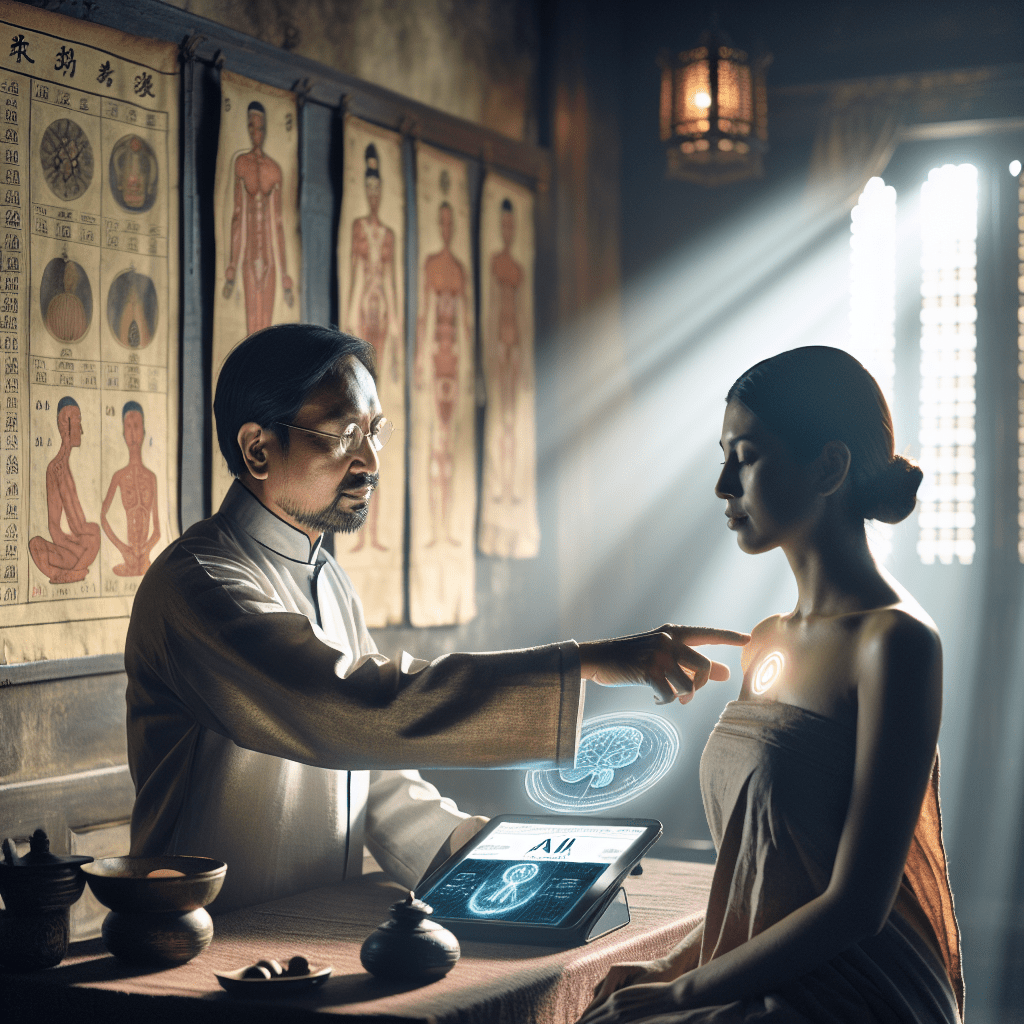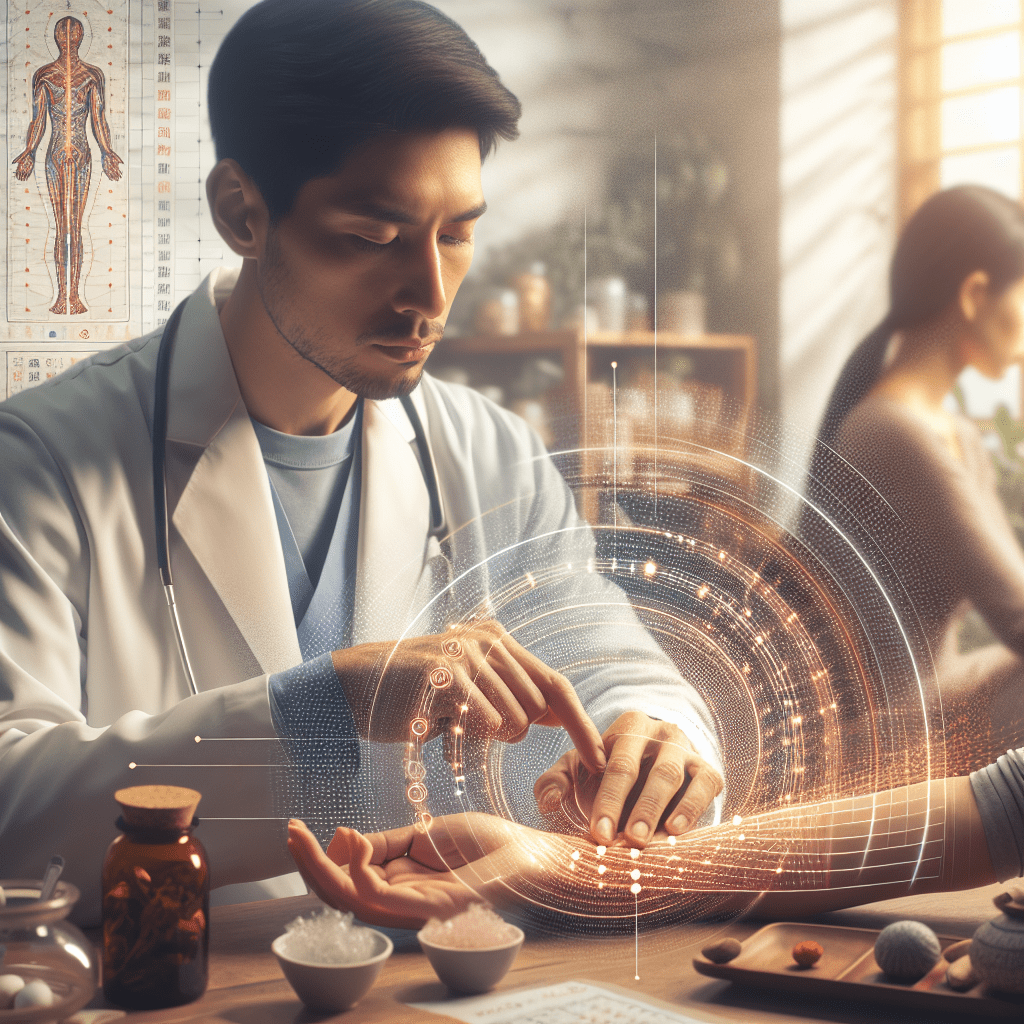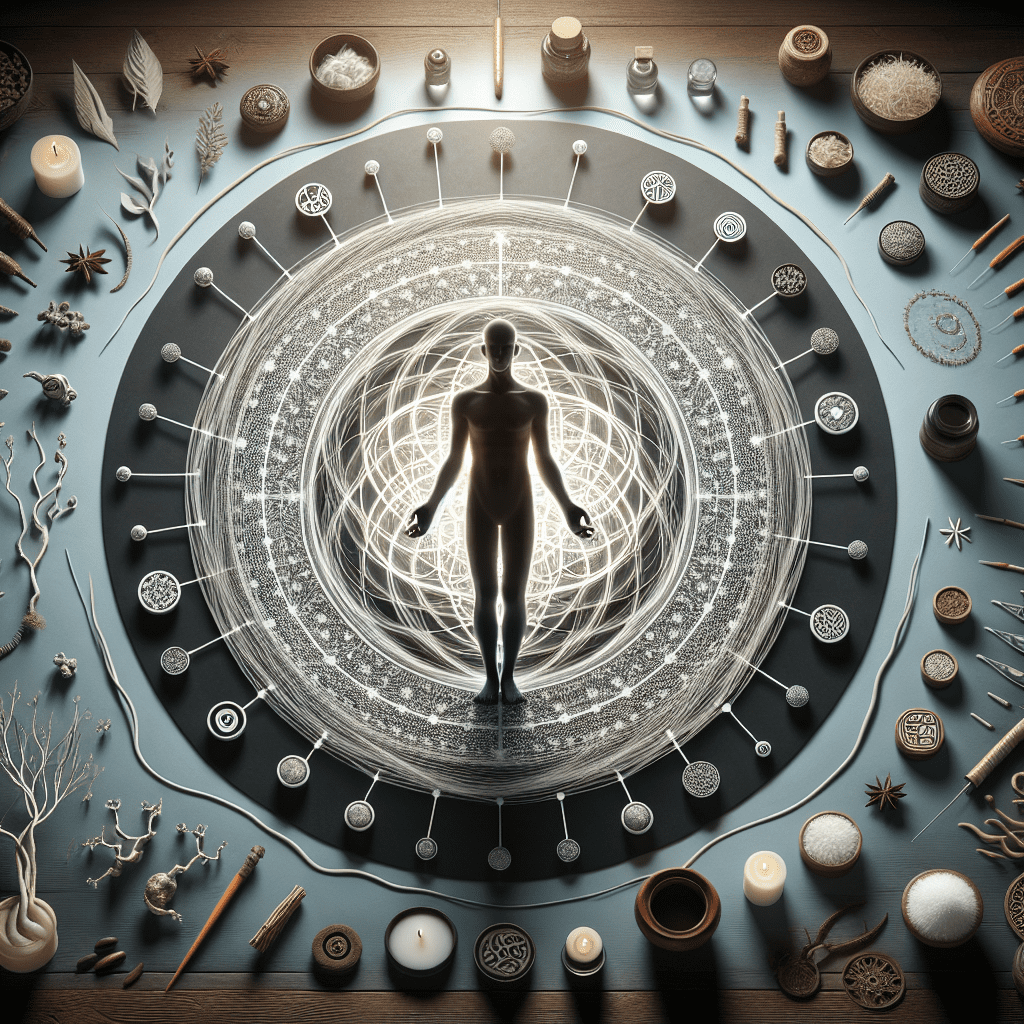The worlds of traditional healing and cutting-edge technology are converging in ways previously unimaginable. In recent years, we’ve witnessed a fascinating partnership developing between Artificial Intelligence (AI) and Traditional Eastern Medicine (TEM), particularly Traditional Chinese Medicine (TCM). This integration represents a truly transformative phase in healthcare, one that brings together wisdom refined over thousands of years with the limitless computational power of modern technology.
This merger isn’t just interesting—it’s revolutionary. As Eastern philosophies teach us that balance and harmony lead to optimal health, AI offers new tools to understand and apply these ancient principles with unprecedented precision. The meeting of these seemingly disparate domains creates a powerful synergy that could reshape our approach to health and healing.
How AI Enhances Traditional Eastern Medicine Practices
The integration of AI into TCM practices is proving pivotal in several key areas. Machine learning algorithms are now capable of analyzing vast datasets of historical TCM treatments, patient outcomes, and herbal formulations that would take human practitioners lifetimes to process. This computational power enables patterns and correlations to emerge that might otherwise remain hidden.
AI systems are particularly valuable in three critical aspects of TCM: diagnosis improvement, treatment personalization, and health monitoring. In diagnosis, AI can analyze tongue images, pulse readings, and patient symptoms with remarkable consistency and precision. For personalization, machine learning models can process individual patient data to recommend specific herbal combinations tailored to a person’s unique constitution. And in monitoring, AI tools track patient progress over time, helping practitioners make necessary adjustments to treatment plans.
One practitioner implementing these advances shared, “The AI doesn’t replace our knowledge—it amplifies it. I can now cross-reference my diagnosis with patterns identified from thousands of similar cases, giving me greater confidence in my treatment approach.”
Deep learning technologies are particularly promising in this field. These sophisticated algorithms can identify subtle patterns in health data that align with TCM diagnostic categories like qi deficiency or liver stagnation. By analyzing these patterns across large populations, AI helps validate traditional approaches while refining their application for modern patients.
Refining Diagnostic Processes Through Data-Driven Insights
TCM diagnostics have traditionally relied on the practitioner’s subjective observations through looking, listening, questioning, and pulse-taking. While these methods embody generations of wisdom, they naturally vary between practitioners. AI brings consistency and objectivity to these processes.
For example, tongue diagnosis—a cornerstone of TCM assessment—can now be enhanced through computer vision algorithms that analyze thousands of tongue images to identify patterns associated with specific health conditions. These systems can detect subtle colorations, coatings, and shape changes that might elude even experienced practitioners.
A real-world example of this integration can be found in the treatment of insomnia. AI algorithms now analyze sleep patterns, heart rate variability, and other biometric data alongside traditional diagnostic information. This comprehensive analysis helps practitioners select specific herbal formulations with greater precision. In a recent study, patients receiving AI-enhanced TCM treatments for insomnia reported a 40% greater improvement in sleep quality compared to those receiving standard TCM care.
Similarly, pulse diagnosis is being revolutionized through sensors that can detect subtle variations in pulse qualities. These readings are then compared against vast databases to suggest potential imbalances according to TCM theory. One practitioner noted, “What once took decades to master can now be augmented with technology that helps confirm what I’m feeling under my fingertips.”
Scientific Validation and Advanced Research
One of the historical challenges facing TCM has been the reliance on anecdotal evidence rather than the randomized controlled trials favored by Western medicine. AI is helping bridge this gap by providing new methodologies for scientific validation.
Advanced AI techniques such as graph neural networks are particularly valuable in understanding the complex relationships within TCM. These networks can map the connections between symptoms, herbal properties, and treatment outcomes, creating a more comprehensive model of how TCM functions.
Recent research utilizing these techniques has identified previously unknown relationships between specific herbs and their biochemical effects on the body. For instance, an AI analysis of traditional formulas for inflammatory conditions revealed that certain herb combinations consistently affected specific cytokine pathways—something not explicitly understood in traditional texts but aligned with their recommended uses.
This scientific validation isn’t about proving TCM “works” in Western terms, but rather about deepening our understanding of how and why these traditional approaches affect human physiology. As one researcher put it, “We’re not replacing traditional knowledge with AI; we’re using AI to illuminate traditional knowledge in ways our ancestors couldn’t.”
The integration of AI with TCM research extends to the synthesis of genomic, proteomic, and metabolomic data, allowing researchers to understand how traditional remedies interact with individual genetic profiles. This moves us closer to truly personalized medicine that honors both traditional wisdom and modern scientific understanding.
Preserving Tradition While Embracing Innovation
As we embrace technological integration in TCM, an important question arises: How do we preserve the essence of tradition while leveraging modern tools? The answer lies in approaching AI as an enhancer rather than a replacement for traditional wisdom.
The holistic philosophy underpinning TCM—understanding health as a state of harmony between opposing forces and seeing the body as an interconnected system—remains the foundation. AI serves this philosophy by providing tools that can better recognize patterns of disharmony and suggest targeted interventions to restore balance.
“The core principles of TCM developed over thousands of years remain unchanged,” explains a leading integrative medicine practitioner. “What AI offers is a way to apply these principles with greater precision in our complex modern world.”
This respectful integration creates a bridge between past and present, allowing ancient wisdom to evolve without losing its essence. It’s particularly relevant for the approach championed by systems like EASTCHI AI, which analyzes users’ constitutional types through Five Element Theory while using modern computational methods to provide personalized recommendations.
The preservation of TCM traditions alongside technological advancement creates a healthcare approach that honors the whole person—mind, body, and spirit—while benefiting from scientific precision. This holistic view is increasingly recognized as valuable even in conventional healthcare settings.
The Future Healthcare Landscape: AI-TCM Collaboration
The ongoing collaboration between AI and TCM points toward exciting possibilities for future healthcare delivery. As these technologies mature, we can anticipate several transformative developments.
Personalized medicine stands to benefit tremendously from this integration. By analyzing individual constitutional factors through the lens of TCM while processing vast amounts of health data, AI systems can generate highly specific recommendations for diet, herbs, acupuncture points, and lifestyle adjustments tailored to each person’s unique needs. This approach aligns with what modern computational systems are increasingly capable of delivering in healthcare.
Public health strategies may also evolve to incorporate this combined approach. Population-level data analyzed through AI could identify trends in health imbalances according to TCM theories, allowing for preventive interventions before disease manifestation. For instance, seasonal dietary recommendations—a cornerstone of Eastern medicine—could be refined based on real-time environmental data and individual health profiles.
Telemedicine platforms incorporating AI and TCM principles are already emerging, making this integrated approach accessible to people who might otherwise lack access to traditional practitioners. These platforms can guide users through self-assessment based on TCM principles, offer personalized recommendations, and connect them with practitioners when needed.
As one healthcare futurist observes, “The marriage of AI with Traditional Eastern Medicine creates a healthcare model that’s simultaneously ancient and cutting-edge. It’s preventative, personalized, and participatory—exactly what modern healthcare needs to become.”
Conclusion: A New Frontier in Global Healthcare
The integration of AI with Traditional Eastern Medicine represents not just a technological advancement but a philosophical one. It acknowledges that optimal healthcare comes from honoring both the wisdom of the past and the innovations of the present.
This collaboration offers solutions that enhance treatment efficacy while preserving the holistic approach that has made Eastern medicine valuable for millennia. By combining the pattern-recognition strengths of TCM with the computational power of AI, we create a healthcare approach that sees both the forest and the trees—the whole person and the molecular details.
As we look toward the future, it’s clear that the AI-TCM partnership has the potential to redefine healthcare delivery globally. From sophisticated clinical settings to remote communities, this integration makes personalized, holistic healthcare more accessible and effective.
The question posed in our title—“Is this the future of healing?”—seems increasingly likely to be answered with a resounding “yes.” As AI continues to evolve and our understanding of traditional practices deepens, we stand at the threshold of a healthcare renaissance that honors the wisdom of our ancestors while embracing the possibilities of tomorrow.
For those interested in experiencing this integration firsthand, platforms like EASTCHI AI offer a glimpse into how traditional Eastern medical theories can be enhanced through artificial intelligence to provide truly personalized health guidance. The future of medicine may well be found in this harmonious balance between ancient wisdom and modern technology—a balance that Eastern philosophies have always taught is the true path to wellness.




